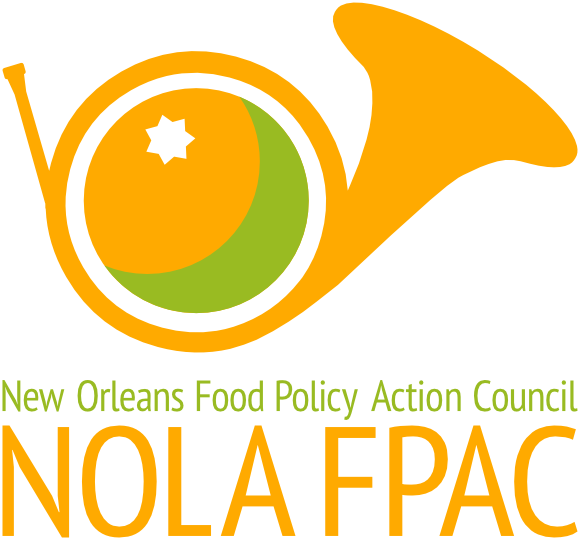
How We Work
Our Mission
FPAC shapes public policy to improve equity, opportunity, and collaboration in our local food system.
Our Vision
We envision a sustainable, culturally appropriate food system that enables all New Orleanians to live healthier, more resilient lives.
Our Values
Equity
All of the work FPAC undertakes will be done through a lens of racial justice, which is defined as the proactive reinforcement of policies, practices, attitudes, and actions that produce equitable power, access, opportunities, treatment, impacts and outcomes for all.
*from Catalytic Change: Lessons Learned from the Racial Justice Grantmaking Assessment Report, Philanthropic Initiative for Racial Equity and Applied Research Center, 2009.
Sustainability
Our work will help meet current needs while ensuring that future generations have opportunities equivalent to or greater than those we have now to participate in a healthy food system.
Economic Opportunity
Everyone should have equal opportunity to support themselves and their families.
Collaboration
FPAC shall involve the community at all levels of our work in order to ensure our work is needed, beneficial, and reflective of the community in which we live and serve. We will also collaborate with other organizations, recognizing that the food system is multifaceted and interrelated and work being done by any affects all.
Evidence-based
Our work will be guided by research and data and will benefit from what others are doing and have done in the field, seeking out best practices locally, nationally, and from around the globe. We will continuously evaluate and make improvements to our work to be sure it is effective and just.
Health
We believe in the overall quality of life for everyone and the right to a healthy mind, body, community, and environment.
FPAC History
2007
In the aftermath of Hurricane Katrina and the levee failures, a group of leaders in the food community convened to discuss and strategize how to get fresh, healthy food into the homes, schools, and workplaces of New Orleanians.
2008
Through a New Orleans City Council resolution, the New Orleans Food Policy Advisory Committee was formed within Tulane Prevention Research Center.. The fruit of this collaboration was the 2008 report, Building Healthy Communities: Expanding Access to Fresh Food Retail, which laid out a set of achievable recommendations to improve access to supermarkets, farmers markets, and other fresh food retail outlets.
2009
FPAC launched its second major initiative, focused on improving School Food and Child Nutrition. The result was the report “Stepping Up to the Plate: Transforming School Food in New Orleans.”
2017
Tulane Prevention Research Center sought to reconvene FPAC with funding from the W.K. Kellogg Foundation, FPAC released findings from a comprehensive food policy analysis, Policy Matters: Assessing the Gaps and Opportunities in Food Policy.
2018
New Orleans City Council re-established FPAC as the advisory body to Council on matters of food access and agriculture through Resolution R-19-501. FPAC was reauthorized in 2021, 2023 and 2024 and stands current as the advisory body to New Orleans City Council, with a strong relationship of collaboration and trust.
2019
FPAC took the helm of the longstanding New Orleans Eat Local Challenge, renaming it Eat Local NOLA. Eat Local NOLA exists to celebrate, promote and understand the local food system and encourage residents to support local food through events, policies, and promotion. In 2023, City Council named June Eat Local Month and recognized the importance that local food plays in our culture, economy and city (Resolution R-23-244).
2020
FPAC became a stand-alone 501(c)3 organization, and received funding for a variety of programs and food system advocacy.
2024
FPAC expanded even further with new staff and an expansion to statewide work. Through funding by the Humana Foundation, FPAC granted a position to the New Orleans Health Department, City Food Specialist, which bridges the gap between nonprofit and city agencies, streamlining collaboration and assisting with continuity and communication within the food system. Additionally, FPAC expanded and launched Louisiana Food Policy Action Council (LA FPAC) and brought on a New Orleans Regional Director to shape and continue the work of New Orleans Food Policy Action Council (NOLA FPAC). New Orleans Food Policy Council is the flagship council of the newly formed Louisiana FPAC and LA FPAC will continue to support and be supported by NOLA FPAC.
